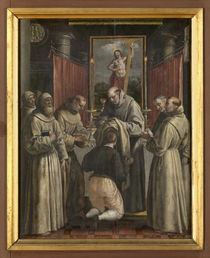The Catholic Defender: Saint Augustine of Hippo
- Donald Hartley

- Aug 27
- 4 min read
Updated: Aug 28
Deepertruth with special permission and aid with Franiciscan Media, a great team for the Lord

His writings influenced the development of Western philosophy and Western Christianity, and he is viewed as one of the most important Church Fathers of the Latin Church in the Patristic Period. His many important works include The City of God, On Christian Doctrine, and Confessions.
Augustine shines out as one whose theology focuses on the central mystery of the Christian faith, God's gracious drawing of humanity into the divine life through the work of the incarnate Word and the life-giving Spirit.
Augustine has also taught us that the human race is united in sin and rebellion against God and cannot save itself. Those who have met with Christ have learned that they must trust him completely and not rely on their own efforts, qualities, or inheritance for their salvation.
For Augustine, love that is in accord with the truth of God's love must be an ordered love, in terms of everything being loved hierarchically according to its proper relationship to God. In fact, for Augustine, all virtue is ordered love.
The idea of truth Augustine believes comes not from ex- perience nor from reason but is innate in man. It cannot come from sense knowledge or reason for these are changeable and truth is not.
The rule, developed by Augustine of Hippo (354–430), governs chastity, poverty, obedience, detachment from the world, the apportionment of labour, the inferiors, fraternal charity, prayer in common, fasting and abstinence proportionate to the strength of the individual, care of the sick, silence and reading during ...
Augustine focuses on Christ's role as the "mediator" between God and man, as well as his Deity. "For as man, he is our Mediator; but as the Word of God, he is not an intermediary between God and man because he is equal with God, and God with God, and together with him one God"
The Father is the principle of the Godhead and alone is unoriginate. The Son is both begotten from eternity and sent into the world in time by the Father. The Spirit both proceeds eternally from God and is given temporally to the Church. God is ineffable mystery.
Wisdom. Wisdom is considered the first and the greatest of the gifts. It acts upon both the intellect and the will. According to St. Bernard, it both illumines the mind and instills an attraction to the divine.
Augustine was instrumental in promoting the “faith seeking understanding” conception of knowledge. He famously declared, “Unless you believe, you will not understand.” He believed that Faith and the Will precede knowledge of God.
Augustine and Evodius both insist that attaining a good will provides us with joy which “calmly, quietly, and steadily bears up the soul.”
A Christian at 33, a priest at 36, a bishop at 41: Many people are familiar with the biographical sketch of Augustine of Hippo, sinner turned saint. But to get to really know the man is a rewarding experience.
There quickly surfaces the intensity with which he lived his life, whether his path led away from or toward God. The tears of his mother, the instructions of Ambrose and, most of all, God himself speaking to him in the Scriptures, redirected Augustine’s love of life to a life of love.
Having been so deeply immersed in creature-pride of life in his early days and having drunk deeply of its bitter dregs, it is not surprising that Augustine should have turned, with a holy fierceness, against the many demon-thrusts rampant in his day. His times were truly decadent: politically, socially, morally. He was both feared and loved, like the Master. The perennial criticism leveled against him: a fundamental rigorism.
In his day, Augustine providentially fulfilled the office of prophet. Like Jeremiah and other greats, he was hard-pressed but could not keep quiet. “I say to myself, I will not mention him/I will speak in his name no more/But then it becomes like fire burning in my heart/imprisoned in my bones/I grow weary holding it in/I cannot endure it” (Jeremiah 20:9).
Augustine is still acclaimed and condemned in our day. He is a prophet for today, trumpeting the need to scrap escapisms and stand face-to-face with personal responsibility and dignity.
To believe in God, he had to find an answer to why, if God is all-powerful and purely good, he still allows suffering to exist. Augustine's answers to this question would forever change Western thought.
Saint Augustine Quotes
Patience is the companion of wisdom. ...
Pray as though everything depended on God. ...
The world is a book, and those who do not travel read only a page. ...
Since love grows within you, so beauty grows. ...
It was pride that changed angels into devils; it is humility that makes men as angels.
See now, let my heart confess to you what it was seeking there when I was being gratuitously wicked, having no inducement to evil but the evil itself. It was foul, and I loved it. I loved my own undoing. I loved my error—not that for which I erred but the error itself.





















Comments